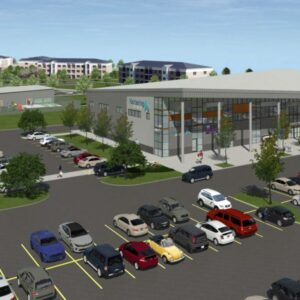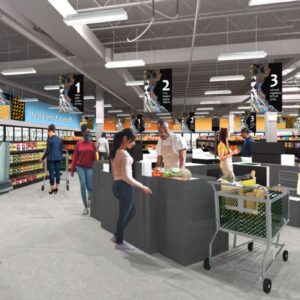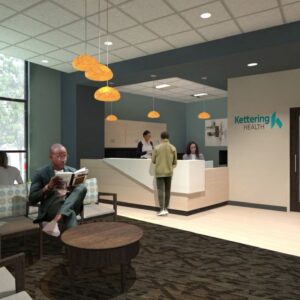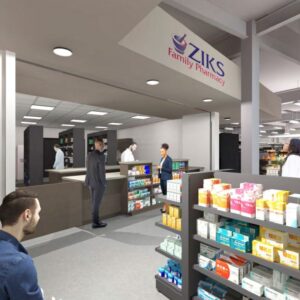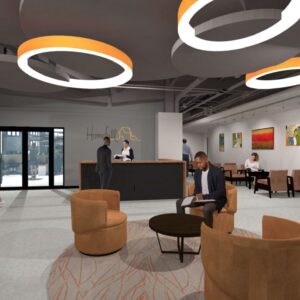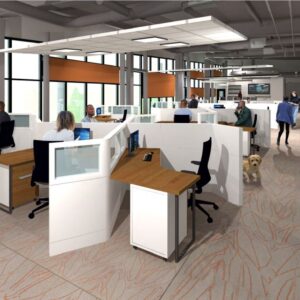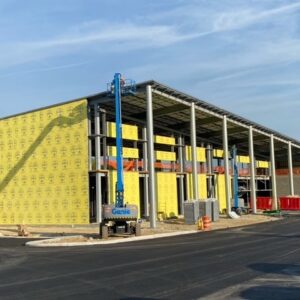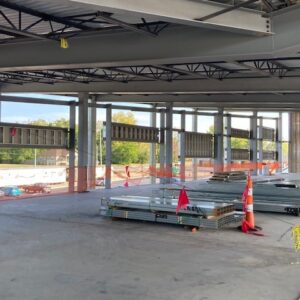In a Nutshell
What: On a long-vacant property that was once the home of a public elementary school, nonprofit Homefull is developing a healthy living campus that will concentrate affordable housing, early childhood education, a full-service grocery store, a community health center and pharmacy, a regional food hub, and quality office and programmatic space for the nonprofit and partners on a 16-acre site meant to address community identified needs and catalyze additional investments in West Dayton.
Sectors: Healthy Foods, Housing, Health Care, Early Childhood Education, Community Development
Location: Dayton, OH (Pineview)
Size: 49,000 square feet
Cost: $18.5 million (phase I only); $50 million total (all phases combined)
Funding and Financing Sources: IFF, federal appropriation facilitated by Sen. Sherrod Brown, American Rescue Plan Act (ARPA) funding via the City of Dayton and Montgomery County, New Markets Tax Credits (allocated by CityWide and PNC CDE, with PNC Bank serving as the investor), State of Ohio capital appropriation, City of Dayton and Montgomery County Community Development Block Grant (CDBG) funding, private foundation and corporate contributions, capital campaign
IFF Support: $7.5 million bridge loan
IFF Staff Lead: Omar Elhagmusa, Senior Lender – Ohio
Design: LWC Incorporated
General Contractor: Brumbaugh Construction
New Markets Tax Credit Consultant: Thompson Hine
Owner’s Representative: Carol Beausay
Impact: 300 short-term construction jobs created; 200 permanent jobs created; approximately 144 housing units created
Early childhood education (ECE), affordable housing, nutritious food, quality health care, and sustainable employment opportunities are pillars of thriving communities. And while any one of these assets is a positive addition to a neighborhood, what kind of impact can be achieved when all of them are available in one easily accessible location?
That’s a question that Homefull is answering as the Ohio nonprofit moves forward with the development of a $50 million healthy living campus that will concentrate programs and services on a 16-acre plot on the west side of Dayton. Revitalizing a long-vacant property that was once the home of a public elementary school, the first phase of the project – which is expected to be completed early next fall – will result in a new, 49,000-square-foot facility that will include a full-service grocery store; a wholesale food hub; a community health center and pharmacy; and high-quality space for social service organizations that will also house Homefull’s offices and several of its core programs designed to combat homelessness by addressing its root causes.
In future phases of the project, the campus will grow to include an early childhood education center and approximately 144 one-, two, and three-bedroom apartments affordable to residents earning less than 80 percent of the Area Median Income. All told, the project will create 200 permanent jobs in the community and 300 temporary construction jobs, providing an important economic boost in West Dayton to deepen the project’s positive impact.
“West Dayton is a very tight knit community that’s long overdue for this type of investment,” says Trudy Elder, Homefull’s chief strategic officer. “This project has been driven by what we’ve heard from residents about what they want to see in the neighborhood, and there’s real pride about what this campus will offer and what it represents for the future.”
Shifting the paradigm in West Dayton
Comprised of 19 neighborhoods divided by U.S. Route 35, West Dayton boasts a proud history as a manufacturing hub that offered Black residents in the region a vibrant place to live with ample employment opportunities. Though many of the community’s residents moved to West Dayton during the Great Migration and in the post-World War II boom years largely because housing discrimination prevented them from living elsewhere in the city, West Dayton was stronger for it – with a multitude of small businesses, cultural assets, and other amenities contributing to the thriving community. As manufacturing in the United States receded, however, the loss of thousands of well-paying jobs in the area fueled a pernicious cycle of disinvestment that was amplified by a legacy of redlining that continues to constrain opportunity today.
“Redlining physically separated the folks that live west of the Great Miami River from the rest of Dayton, and the area has been without much investment for a long period of time,” explains Elder. “The outcome of that is that the ZIP code where our project is located – 45417 – has the lowest income per capita in Montgomery County and is one of the most economically challenged communities in all of Ohio. At the same time, there are highly engaged community groups committed to building on the community assets there to revitalize West Dayton and address longstanding barriers, however complex they may be.”
“By concentrating multiple services in one location, Homefull hopes to make it easy for West Dayton residents to access resources crucial to the wellbeing of the community while also creating operational synergies that reduce overhead costs.”
Among those community groups are the Pineview and Fairlane Neighborhood Associations, on whom Homefull relied heavily for input about the future of the 16-acre site. With the community’s only grocery store closing around the same time that Homefull purchased the property, that’s where planning began for the healthy living campus. Through continued engagement with residents and community leaders, quality health care was identified as a priority following the closure of a local hospital. And with Homefull’s 35-year history focused on ending homelessness, affordable housing was a natural fit for the campus too, with the recognition that basic amenities needed to be readily available before new housing was built.
“One of the pieces of feedback we heard during the planning for the campus was that transportation is a challenge that prevents residents in West Dayton from accessing basic services,” says Elder. “By putting everything planned for the campus in one place, which is along a bus line, more people will be able to get the support they need in their own community. And then from a practical standpoint, having many of the amenities on the campus under one roof reduces the facilities management burden.”
A one-stop-shop for health, food, and jobs
More than halfway through the first phase of construction, the six-acre section where many of the resources will be located is starting to take shape. Designed by LWC Incorporated and being built by Brumbaugh Construction, the focal point of phase one is a 49,000-square-foot facility packed with amenities. On the first floor, Homefull will operate a 14,000-square-foot, full-service grocery store offering fresh, local produce and culturally relevant food options. By operating the store as a nonprofit, Homefull will be able to use grant funding to ensure that food prices remain budget-friendly.
Next to the grocery store will be the 4,000-square-foot regional food hub, which will include space for refrigeration, prep, and storage. The goal of the food hub – which Homefull will operate in partnership with What Chefs Want! and Local Food Connection – will be to connect local growers to institutional buyers like schools and hospitals interested in implementing farm-to-table principles in their cafeterias. Local food producers will drop off their products at three cargo bays on the north end of the facility, which Homefull will purchase, aggregate, and re-sell – shortening the supply chain for fresh produce and streamlining distribution for local farmers.
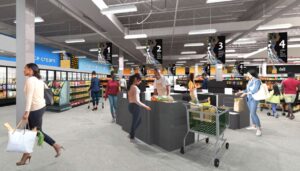
An architect’s rendering of the grocery store on the campus.
“We’ll purchase the food on the spot from small and medium-sized farms in the area, meaning they won’t have to spend as much time at stands selling their products at markets on the weekends, giving them more time for planting and harvesting,” says Elder. “We’ll store and aggregate the food before selling it to large buyers who have expressed interest to us in incorporating more fresh, local food at their institutions. This model not only increases access to nutritious food but creates all kinds of job opportunities. We’ll be hiring people to work in the warehouse stocking shelves just like we will in the grocery store, and the goal is to hire clients who are unemployed or underemployed who we’re serving through Homefull’s other programs.”
Opposite the food hub will be a 3,000-square-foot primary care center operated by nonprofit Kettering Health, which will lease the space to offer culturally sensitive, state-of-the-art health services and education. The health care clinic will be adjacent to a 2,000-square-foot pharmacy operated by ZIKS Family Pharmacy (ZIKS), a locally, BIPOC-owned business. ZIKS opened its first pharmacy in 2009 after big-box providers left the community and currently operates two locations in West Dayton that have enabled the business to build trust with local residents. Rounding out the space on the first floor will be a small community room that will supplement a space for larger events on the second floor.
Upstairs, Homefull will relocate its administrative offices and its rental assistance, housing stability, behavioral health, and workforce development programs to a 10,000-square-foot space – bringing an additional 45 jobs to West Dayton. Homefull’s services will be complemented by partners the nonprofit plans to lease space to in a 6,000-square-foot section of the building next to its own. One example of an organization that will use the space is Sinclair Community College, which is planning to house its agriculture program in the facility. Though preliminary, the school’s plan is to establish a one-acre teaching farm on the campus that will be irrigated using rainwater collected by the facility’s pitched roof catchment system.

An example of Willis “Bing” Davis’ artwork, which will be displayed on the healthy living campus.
To honor the West Dayton community, Homefull has acquired a large piece of art by renowned artist Willis “Bing” Davis, who grew up in Dayton and has lived and worked on the west side of the city for decades. The piece will span the facility’s first and second floors, providing a burst of color meant to inspire all who visit. Davis’ art will also be incorporated elsewhere in the building via wayfinding signs.
“Bing is an internationally recognized artist who grew up here and still has his studio near the campus,” says Elder. “He and his wife, Audrey, have been extremely supportive of what this project means for West Dayton, and so we think it’s fitting that his work be prominently displayed in a way that members of the community will immediately recognize.”
To realize its vision, Homefull has secured a diverse mix of funding that reflects widespread belief in its potential to catalyze a new wave of investment in West Dayton. In addition to an ongoing capital campaign, the $18.5 million first phase is being completed with a federal appropriation facilitated by Sen. Sherrod Brown, American Rescue Plan Act (ARPA) funding via the City of Dayton and Montgomery County, New Markets Tax Credits (NMTCs) allocated by CityWide and PNC CDE (with PNC Bank serving as the investor), a State of Ohio capital appropriation, City of Dayton and Montgomery County Community Development Block Grant (CDBG) funding, and contributions from a multitude of private foundations and corporations in the region. IFF provided a $7.5 million bridge loan that enabled Homefull to close the NMTC transaction.
“IFF entered the project after we’d met with some traditional lenders who we didn’t feel were offering the level of innovation in how the loan was structured or the amount of support that we needed to close the deal,” says Elder. “Knowing that IFF had experience with this type of project at this scale and was willing to partner with the other parties involved with the New Markets Tax Credits to get it done, helped us get to the finish line.”
And more to come…
“The real impact we want to see in the years ahead is the campus sparking additional investment in the area and being of service to future generations of West Daytonians…”
Once Homefull completes the first phase of construction next year, the organization will move forward with developing affordable housing and an early childhood education center on the remaining 10 acres of the campus. Preliminary plans include energy efficient apartments lined with pathways to make the campus easy to traverse and plenty of green space. Upon completion, Homefull hopes the campus will catalyze additional investments in West Dayton to further strengthen the community and accelerate the momentum created by the project and other recent developments, such as the new, 24,000-square-foot branch of the Dayton Public Library a half mile away.
“You can drive up and down the street from the campus right now and see and hear the vibe from residents, with a lot of excitement about the reinvestment in the community that’s now underway and, in many ways, hope lives again in West Dayton,” says Elder. “But the real impact we want to see in the years ahead is the campus sparking additional investment in the area and being of service to future generations of West Daytonians by providing them with a place where they can shop for groceries, or visit their doctor, and live and work – all without having to leave their community.”
Read about additional nonprofit facilities in Ohio financed by IFF
Tags: : Capital Solutions, Community Development, Early Childhood Education, Health Care, Healthy Foods, Housing
